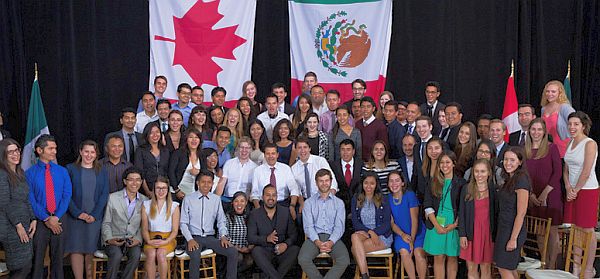It’s not every day a college student gets to be involved in a discussion with the prime minister of Canada and the president of Mexico. But on Tuesday June 28, a University of Calgary student and a recent grad had the unique opportunity to do just that when they were selected to be involved in a dialogue on international education exchanges with Prime Minister Justin Trudeau and President Enrique Peña Nieto of Mexico.
Nicole Isaak, BA’16, and Tessa Warren, a third-year science student, were two of 80 students from across Canada and Mexico selected to be involved in the discussion. Both students have experience with international exchanges in Mexico; Isaak did a group study program in Mexico as well as a year-long exchange in Ecuador, while Warren heads to Mexico this fall to participate in an exchange.
The discussion centered on the importance of inclusive education and creating understanding of cultural differences. As part of this event, Peña Nieto and Trudeau announced their intention to make it easier for students to travel back and forth between Canada and Mexico on exchanges by welcoming new partnerships between Canadian and Mexican education institutions. Trudeau also announced that as of December 1, 2016, Canada will be lifting the Mexican visa requirement, which will make it easier for Mexican students and visitors to come to Canada.
“Education is a passport to greater opportunities, stronger relationships, and a better future. Today’s announcement will expand our people-to-people ties for generations to come, and give young Canadians and Mexicans the opportunities they need for the future they want,” said Prime Minister Trudeau.

Prime Minister Trudeau and President Nieto take questions from youth during a Q&A at the Museum of Nature in Ottawa. June 28, 2016. (Photo: www.ucalgary.ca)
Educational exchange important to both countries
Both Isaak and Warren were happy to learn that international educational exchange opportunities are important to the governments of Canada and Mexico.
“Speaking as a student, the benefits are huge as both countries are trying to make studying abroad a lot easier when it comes to visas, monetary issues and language barriers,” said Warren. “Classes are another factor to consider when studying abroad, and both leaders spoke about trying to unify courses in both countries so courses transfer easily from school to school.”
Isaak is excited about the possibility of more students choosing to study in Latin America as a result of these new partnerships. “I think one of the most important things gained from international education is an understanding of cultural differences, and I believe that this can carry over into a respect and understanding of people of all cultures,” she said. “When on an exchange, you interact on a daily basis with local people. You learn about their customs and culture, the challenges they face in their daily lives, and why they do the things that they do. As a result, you stop to think before making assumptions or judging people who you don’t understand or seem different.”
The University of Calgary has a strong and prosperous relationship with Mexico, identified as a country of emphasis in the International Strategy. As of fall 2015, the university’s has 13 active agreements, various research collaborations with higher education institutions in Mexico and 73 Mexican students enrolled.
Click HERE to learn more about studying abroad in Mexico and take advantage of thegenerous funding available.
Source: ucalgary.ca



Comments are closed.